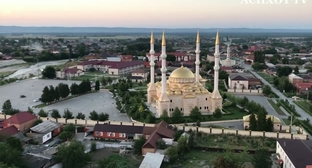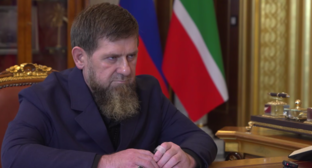07 October 2009, 12:00
Two years of Imarat Kavkaz: jihad spreads over Russia's south
Today is two years after the leader of North-Caucasian militants Doku Umarov proclaimed the Islamic state - the Imarat Kavkaz. From the time when the accent in the ideology got offset from the political aspect to the religious one, the situation in Northern Caucasus has noticeably aggravated. Supporters of Imarat organized a continuous range of attempts on state officials and terror acts committed by suicide bombers.
Jihad as end in itself
In summer 2006, Doku Umarov became the head of the self-proclaimed Chechen Republic of Ichkeria (ChRI); it happened after the death of the previous President of the ChRI Abdul-Khalim Sadulayev, who declared, on February 13, 2006, his programme aimed at uniting Northern Caucasus into a single Islamic state. The grounds for declaring this state were found "in the unconditional duty of Moslems before the Allah to establish the rule of Allah - Shariat - in their controlled territories."
Already on October 7, 2007, Umarov, acting in compliance with this programme, abolished the ChRI and proclaimed a new formation - Imarat Kavkaz, having declared introduction of complete Shariat rule in "all the territories of Northern Caucasus, which are zones of armed actions." Doku Umarov proclaimed himself to be Amir of Caucasian militants, the leader of jihad and "the unique legitimate authority in all the territories where mujahads are present."
The Umarov's decree on declaration of Imarat provoked a split in power agencies of the ChRI. Ahmed Zakaev, former emissary of Chechen separatists, who is in London, and a number of deputies of the parliament of Ichkeria accused Umarov of self-withdrawal from his official duties and proclaimed transfer of the whole power to the parliament of Ichkeria. Ahmed Zakaev became acting prime minister in the government of Ichkeria.
The split between supporters of Zakaev and Umarov became still deeper this summer, after Zakaev launched direct contacts and negotiations with the authorities of Chechnya and ordered the head of the general staff of the armed forces of Ichkeria to stop attacking Chechen militiamen, except for self-defence cases. Supporters of the Imarat accused Zakaev of betraying Islam by recognizing the legitimacy of Ramzan Kadyrov's government and sentenced Ahmed Zakaev to death.
The verdict to Zakaev was signed by the Supreme Judge of Imarat Kavkaz Caucasus Anzor Astemirov, who is in search on charges of participation in the armed attack to Nalchik on October 13, 2005 and whom the authorities announced liquidated in the course of special operation in Nalchik on May 28. However, people from Zakaev's retinue believe that the death sentence was passed by one of militants' leaders Movladi Udugov.
In his interview to the Georgian information agency "Pirveli", Udugov named Zakaev's government "a group of swindlers and speculators" and noted that the ChRI could not have its own government, since it became a vilayat (administrative territory, - comment of the "Caucasian Knot") of the Imarat. Movladi Udugov added that militants' forces kept growing day after day, and 2009 became "the year of advance of the mujahads of Imarat Kavkaz"; he treated the declaration of Imarat as "the historically justified claim of Caucasian Moslems who had always used a slightest opportunity to get united on the basis of Islam."
Failed "armistice"
Ahmed Zakaev's order to stop, since August 1, any attacks on employees of power agencies of Chechnya was not perceived by militants as a guide to action. The resistance of the armed underground not slackened, but even noticeably amplified. This conclusion can be made, in particular, after comparative analysis of the archive data of the "Caucasian Knot" and the open sources, which present statistics on the situation in Chechnya during equal time intervals before and after cancellation of the counterterrorist operation (CTO) regime. As of today, the data is available for 70, and - in the Russian version - 100, 120, 150 and 170 days.
"Kadyrov with Zakaev may agree for so long as they wish, but, basically, it'll give nothing, because separatists' armed formations are under control of Doku Umarov and under command not of the field commanders of the Ichkeria time, but of absolutely different people - 'Amirs of Jama'ats'. By and large, they see no special difference between Kadyrov and Zakaev," a leader of one of local NGOs gave this comment on the current situation in Chechnya to the "Caucasian Knot".
The activity of the armed underground is not limited to the territory of Chechnya - similar trends are also observed in the neighbouring Ingushetia and Dagestan, from where messages on crimes against militiamen and servicemen arrive in fact on the daily basis.
The "Caucasian Knot" offers its readers the chronicle of events registered in Chechnya, Ingushetia and Dagestan (see in the Russian version) and reflecting the trends in the escalating conflict of power agencies with groups of militants.
Shahids come back
A notable this year's peculiarity in escalation of the armed conflict in Chechnya was the return of the tactics of committing terror acts by shahids (militants-suicide bombers).
In April 2009 (the month when the CTO regime was lifted in Chechnya), Doku Umarov reported in his video address, which was promulgated by the websites supporting militants of Northern Caucasus, about revival of the battalion of suicide bombers named "Riyad as-Salikhiin". Then, he reconfirmed this information in his interview to the edition "Prague Watchdog" of July 4, having stated that "mujahads" were planning new "operations" and that for this purpose they had more opportunities than Shamil Basaev, who founded the "Riyad as-Salikhiin" in autumn 2002 and then perished on July 10, 2006, in explosion of the truck full of explosive, which he accompanied to Ingushetia.
Soon after that, on May 15, 2009, a terror act was committed by a suicide bomber near the MIA building in Grozny. After that, the authorities of Chechnya made a decision to launch broad-scale special operations against militants with the aim of complete liquidation of the armed underground, which continue till now.
In the end of July, shortly before Zakaev's announcement of the above "armistice", one of the websites supporting militants placed a material that the field commander Moslem Gakaev had sent 20 shahids to the flatland Chechnya with instruction to commit suicidal terror acts against local law enforcers.
Soon after that, on July 26, militant Rustam Mukhadiev blew himself up at the theatrical-concert hall in Grozny killing several high-ranking MIA officers and two foreign citizens.
This incident was followed a whole series of self-explosions of suicide bombers. Thus, on August 21 in Grozny, two suicide bombers killed four militiamen and a local woman. The next self-suicidal action was committed by militants on August 25 in Mesker-Yurt village, Shali District. At night on August 28, two suicide bombers triggered their "shahid belts" in the city of Shali. Two more terror act were committed in Chechnya by suicide bombers in September and one more - on October 1.
Explosions of suicide bombers were registered not only in Chechnya, but also in neighbouring Dagestan and Ingushetia.
In the morning on September 1, a terrorist-suicide bomber blew up his car near the northern post of the STSI (State Traffic Safety Inspectorate, also known in Russia as "GIBDD") in Makhachkala, where he was stopped for check of documents. 13 persons suffered, one of them died.
The most resonant, by the number of victims, was the terror act committed by a suicide bomber on August 17 in Ingushetia, as a result of which 25 persons were killed and over 260 others wounded. The investigation assumes involvement in this terror act of Said Buryatskiy (also known as Alexander Tikhomirov), the ideologist of militants of Northern Caucasus.
After the Imarat Kavkaz was announced as a religious state, Tikhomirov made a decision to join Doku Umarov's groupings, and in spring 2008 he appeared in the Sunzha District of Ingushetia, where militants had their bases at that moment. His sermons of radical Islam became well-known and, according to the YouTube statistics, rather popular. According to the "Novaya Gazeta", if Said Buryatskiy himself was the executor of the terror act in Ingushetia, each record of his sermons can become a most powerful ideological weapon, as many Moslems can follow him.
Russia is no limit and civilians are no exception
In his appeal of October 7, 2007, while proclaiming the Imarat Kavkaz, Doku Umarov noted that the struggle for the Shariat order should not be limited to the territory of Northern Caucasus, and even Russia, and called his supporters to global jihad.
"Today, in Afghanistan, Iraq, Somalia and Palestine our brothers are at war. All who have attacked Moslems, wherever they did it, are our enemies," said Umarov and enumerated America, England and Israel among such "enemies", and "everyone who is at war on Islam and Moslems."
In September last year, a website covering the activities and structure of Imarat Kavkaz placed a message that "at present, the armed forces of Imarat Kavkaz are essentially controlling the mountain regions of Dagestan, Ichkeria, Ingushetia, Kabarda, Balkaria and Karachai." These territories were defined as "the military activity zone of the armed forces of Imarat Kavkaz." Also, "the zone of subversive military actions" was defined as the "foothill and flat areas and settlements of the above vilayats, and also vilayats of Iriston (North Ossetia; on May 11, 2009, Iriston was abolished and included into vilayat Galgaiche (Ingushetia)) and the Nogai Steppe (Stavropol Territory), western and the Black Sea coastal areas of Northern Caucasus", and also "the Pre-Volga and Ural regions of the Russian Federations."
In September this year, the resources, which support militants, disseminated Umarov's appeal to still more strengthen the struggle during the sacred Moslems' month of Ramadan, which was named "the best time for jihad."
A new feature of the struggle held by supporters of the Imarat was an expansion not only of the territorial limits, but also of the very concept of "enemy". In the above interview to the "Prague Watchdog" of July 4, Doku Umarov let know that henceforth the target of "mujahads" would be not only power agents, but also civilians - those who had accepted the Moscow-supported authorities of the republics of Northern Caucasus.
The terror acts committed during several recent months by suicide bombers in Northern Caucasus lead to conclusion that the applied theory has passed into practice - in most cases suicide bombers blew themselves in crowded areas; therefore, not only militiamen but also peaceful residents became victims of these actions.
"Those who are today at war in Chechnya and other republics of Northern Caucasus are no longer speaking about the struggle for independence of Ichkeria. They have absolutely other ideals and absolutely other goals. Umarov has transferred the war into religious opposition, where mujahads, that is, fighters for the faith, are on one side, and the other side includes kafirs (disbelievers), who had occupied the Moslem republics of the Caucasus, and their helpers - 'murtads' (turncoats) from among 'national-traitors'," notes one of local observers in Chechnya.
Analysts' observations and forecasts
The conflict inside the camp of militants in Northern Caucasus is now a dispute of two ideologies: of the "separatist ethnic nationalism (the aim being a sovereign Chechnya even without the brotherly Vainakh Ingushetia)" and the "universal religious project", where the fight of the individual is "incorporated into the global jihad; and its final goal is not limited to Northern Caucasus, and even, by and large, to Russia", said Sergey Markedonov, deputy director of the Russian Institute for Political and Military Analysis.
In his opinion, the opponents of the authorities who fight for Imarat Kavkaz have a stronger ideological motivation than the separatists who were building the independent Chechnya on the basis of its opposition against the "empire".
"It will be much more difficult to bribe or over-propagandize them (supporters of Imarat). The propaganda should be aimed not so much at them but at the doubting or hesitating population. And people hesitate for one simple reason - for absence of any positive policy of the authorities and, as a consequence, of positive social dynamics," Mr Markedonov wrote in his article "Severe Verdict and Its Consequences" placed in the website "Politcom.Ru".
Shura Butrin, an observer of the "Russian Reporter", believes that ten years were enough to understand that Russia is unable to eradicate resistance in Northern Caucasus in the military manner. "Two years ago Doku Umarov proclaimed abolition of Ichkeria and creation of Imarat Kavkaz. Very few people paid attention to it, as it seemed that certain virtual matters were in play, just another name of a terrorist grouping. But it was a real point. Part of North-Caucasian population does not live in Russia. They would not like to have anything in common with it. For them, Russia is an occupant-state, which had seized their lands. There are tens of thousands of them. Naturally, the underground resistance will exist in this environment," Mr Butrin writes in his article "Ten Years of Second Chechen War."
The author emphasizes that within ten years the resistance of the armed underground in Chechnya has changed strongly: "In the course of the first and second wars, they were scattered groups of people with very different motivations. There were heroes and bandits, peasants and occasional, ordinary people among them [...]. Most of them, when it became clear that the war was lost, joined Kadyrov. Now, the war is more invisible; it's easier to hide it - but it's much more serious. Resistance is now free of occasional people; it has turned into a religious sect with powerful ideology. Its basis is jihad. Militants have completely got rid of nationalist ideas; they are no longer interested in independence of Chechnya. Jihad is now their sense of life - their supreme self-realization."
Russian historian Boris Sokolov sees the end of struggle, held by Russian power agencies against Islamic rebels and underground fighters in Northern Caucasus, in one of three scenarios. "Scenario No. 1: the Islamic underground is liquidated, and the national republics of Northern Caucasus remain in the Russian Federation. Scenario No. 2: the republics of Northern Caucasus get their political independence and Russia-friendly regimes set up there, capable to bridle radical Islamites. And, finally, scenario No. 3: an Islamic state - Imarat (Emirate) Kavkaz - extremely hostile to Russia - appears instead of North-Caucasian republics," Mr Sokolov writes in his article "What instead of 'Imarat Kavkaz'?" published in the "Russian Magazine".
"By its multi-billion donations the federal centre buys the loyalty of North-Caucasian elites, while keeping eyes closed to the fact that most of the funds are plundered and used not to the purpose; so that ordinary citizens get just dribs and drabs from Moscow's gifts [...]. No wonder that mujahads with their adherence to the simplicity of primary Islam are highly popular among the local population," Boris Sokolov marks, adding that "Umarov's mujahads" coordinate their actions across the whole Northern Caucasus, irrespective of administrative borders, while the federal centre has to adhere to these borders in its policy.
Ruslan Kurbanov, another author of the "Russian Magazine", notes that "salafization" or "fundamentalization" of the regions in the Caucasus, where Islamic traditions were lost or undermined in the Soviet time (Nogai districts, Southern Dagestan and Kabarda), launched in early 2000s, has already become practically irreversible. He quotes Abdurashid Saidov, one of the witnesses of the rout of salafite communities of Dagestan: "When the authorities started to combat the religious ideology with their habitual clumsy methods - by repressions and persecutions […], a mass exodus of dissidents to Ichkeria began […]. Persecutions have rallied fundamentalists, lifted their spirit, strengthened their will to victory and qualitatively improved their arms and fighting capacity."
Authorities' viewpoint
Meanwhile, the point of view of the authorities on the situation in the North-Caucasian region implies that the activity of militants here is not independent, but staged and fed from abroad, both with human resources (experts on subversive-explosion war and recruitment of new jihad adherents), and with materials means (money, weapons and ammunition).
"The Arabs who write fatwas for these actors: 'You kill a militiaman - and you're shahid at once,' are backed by special services, including American and English ones," says President of Ingushetia Yunus-Bek Evkurov.
As reported by the state body "Grozny-Inform Information Agency", founded by the Ministry of the Chechen Republic for National Policy, Press and Information, there are no official documents evidencing the involvement of separate leading world powers to the attempts of destabilizing the criminal and political situation in the North-Caucasian region, but the facts of the links of domestic Islamites with foreign sponsors are on hand.
President of Chechnya Ramzan Kadyrov is confident of possible liquidation of all militants and believes that to solve the problem of illegal armed formations, the efforts of law enforcement bodies of Dagestan, Chechnya and Ingushetia should be united.
In the territories of Chechnya and Ingushetia power agents continue their reinforced operations against members of the armed underground. The most significant results of these operations are the capture of Rustaman Makhauri, a mid-level militants' field commander and liquidation of a group of eight militants, headed by Abubakar Pashaev, Amir of Jama'at of Azamat-Yurt village, Shelkovskoy District of Chechnya.
At the same time, the deadline appointed by Kadyrov for eradication of the armed underground in the territory of Chechnya is permanently postponed. This May, he appointed the term of two weeks, in June - a month; and in September the head of Chechnya stated that 2009 is "the last year for bandits."





Комментирование через Кавказский узел